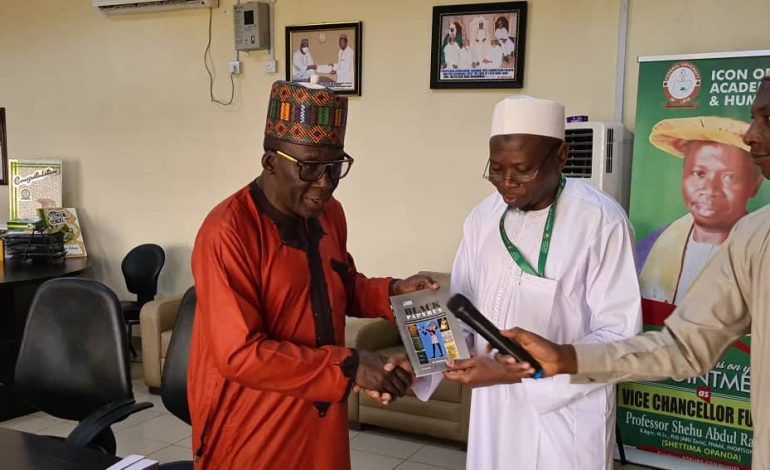Don speaks on groundbreaking book on ‘origin of writing, written literature traced to Black Africa’

By Malam Al-Bishak
I’M extremely overwhelmed by the outpouring of love manifest in the positive responses to my latest book, BLACK PAPYRUS: Global Origins of Writing and Written Literature Traced To Black Africa. I thank everybody without exception. I have noted with utmost gratitude and honour your desire to own a copy of the book either as a gift or by purchase. I pray that I’m able to satisfy you in this regard.
I must, however, thank my Vice Chancellors at the Federal University of Lafia (FULafia), Nasarawa State, Professor Muhammad Sanusi Liman and his successor, Professor Shehu Abdul Rahman, for finding the book worthy of sponsorship and recommending it to TETFund for publication. I must also acknowledge my teachers in Zaria and Lagos for their congratulatory messages or kind remarks. They include Professors Sani Abba Aliyu and Philemon Gomwalk (ABU); Professors Adimora Akachi-Ezeigbo (formerly UNILAG) and Femi Osofisan (The Guardian), and my Jamaican-born journalistic mentor, Chief Lindsay Barrett. They have enriched me with robust intellectualism and sense of African patriotism. I’m deeply grateful.
The book is of 208 pages including the preliminaries and index, with tiny but readable font, spread across seven (7) chapters with 20 full colour pages on gloss paper highlighting people and materials about ancient Egypt to give vivid picture of the antiquity and the greatness of the African past. The Foreword of the book was written by Prof. Shamsudeen O.O. Amali, the ex-Vice Chancellor of University of Ilorin and Nasarawa State University, Keffi, and the Postscript was written by Prof. Isaac Barko Lar of University of Jos. The book is sub-titled, ‘A Pill for Racial Healing,’ and dedicated to my proud students and my late teacher and PhD External Examiner, Prof. Tyodzuah Akosu, ex-DVC, Benue State University, Makurdi.

Chapter One is titled ‘The Rise and Fall of Ancient Egypt and Denigration of the Blackman. It talks about the first world empire, the Egyptian Empire, and how it ruled the world, and in the process exported its cultural legacies including formal education: schools and writing materials. At that time the blacks enslaved the whites for about 3000 years along the Mediterranean. But, following its invasion by the Asians (Hyksos) from 1730 BCE, the Egyptian Empire fell, and the blacks began to be enslaved by the whites hence the propaganda about the inferiority of the blacks. However, it ends with a sub-heading: ‘Greek Early Writers Admit to their Knowledge Sources from the Blacks.’
Chapter Two is titled ‘Literature, Racial Prejudice, its Meaning, Emergence and Techniques. It defines literature, and how racial prejudice affects its meaning. It explains the emergence of the three literary genres, and discusses their taxonomic qualities.
Chapter Three is titled ‘The Emergence of Writing and Written Literature,’ and discusses types of writing from the hieroglyphic to alphabetic; addresses the debates between the Egyptian ‘hieroglyphs’ and Sumerian ‘cuneiform,’ as to which emerged first with dates, and the widespread tradition of writing in Africa before the Eurasians came.
Chapter Four is titled ‘The Pioneering Literary Status of Ancient Egypt’ talks about how ancient Egypt pioneered written poetry, the novel, written drama, the earliest scriptures, with schools up to university level, exported writing to Eurasia, impacted Greek education, influenced Greco-Roman literature and its mythology birthed Greco-Roman mythology.
Chapter Five is titled ‘Ancient Egypt Influenced Early Greek Writers,’ and explains the ancient Egyptian literary influence on Hesiod, Homer, Aeschylus, Sophocles, Socrates, Plato and Aristotle. It ends with the sub-heading, ‘Adaptation of European Fiction by African Academics.’ The adaptation of Greek or French literary works by Femi Osofisan, Wole Soyinka, Iyorwuese Hagher, Ola Rotimi, etc is shown to be not a sign of inferiority complex because European authors had extracted materials from ancient Egyptian sources. Examples are given.
Chapter Six is titled, ‘Textual Analysis of Ancient Egyptian Written Literature.’ Both the thematic and formalistic analyses are made of ancient Egyptian written poetry, novel and drama, and compared with European texts to show that the Europeans simply borrowed from black Africans the art of literature. It therefore dismisses the claim that literary forms were imported from Europe into Africa. The reverse is the case.
Chapter Seven is titled, ‘Conclusion – Postmortem,’ and highlights the research findings with recommendations. It ends with a quote by Marcus Garvey that, “Black men, you were once great; you shall be great again.”
The pictures show the map of Egypt and the so-called Middle East; the black Pharaohs often presumed to be white; hieroglyphic writing with its A-Z alphabet; the Egyptian numerical symbols from 1 – 1,000,000; the Rhind papyrus containing calculations and diagrams; the first paper industry in the world in ancient Egypt; the statues of ancient Egyptian scribes; different Egyptian scripts from which the Roman and Arabic scripts emerged; the statues of black ancient Egyptians; the ancient Egyptian school; writing materials including pen, ink, paper, etc. Everything about formal education existed in ancient Egypt some millennia (thousands of years) before Africa’s invasion by Eurasians (Europeans and Asians). All the foreigners did is to destroy African heritage or steal it to their homeland or appropriate it to themselves via modification. They now claim that they met savage Africans whom they had to civilize via slavery and colonialism! This is farther from the truth.
Promotional Tour
MY great fan and brother, Professor Sola Olorunyomi of the University of Ibadan and current Association of Nigerian Authors (ANA( President, Dr. Camilus Ukah have impressed upon me to look for grants that will aid me to embark upon a tour of Africa to promote the book. I’m grateful for their encouragement and suggestion, and will try. Anybody with useful ideas to do this is welcome.
The Goal of the Book
MY great colleague, Onwuka Orji-Mba, who will be a Professor in due course (God willing), wrote, “This is groundbreaking! I’m sure that with this book, the curriculum of modern African literature will be revisited.
Congratulations, Prof.” That’s it! I have said that, “It is imperative to teach literary history in African schools dating back to over 5000 BCE, which is beyond the date the first Eurasians invaded Africa, and eventually occupied parts of it (Al-Bishak Black Papyrus 153). I stated further that, “This research hopefully satisfies the eternal reflection of iconoclastic historian, Martin Bernal, that, ‘It is not madness to challenge the authority of so many academic disciplines’ (cited in Al-Bishak, _Black Papyrus, 154).” I’m happy that Nigeria’s premier university, UI, has started this process of reawakening the consciousness of Africans through the pioneering effort of Prof. Olorunyomi who has included my books on ancient Egypt in his school curriculum. Of course, my students are already familiar with the subject and books.
Distribution
BEING a sponsored book, I’m not sure if it can be sold. I will clarify with TETFund. Nevertheless, I have already experienced the bitter side of shipping when gifting a book. It could even cost more than the book itself. So it’s better to mass produce and distribute it so that it can be bought cheaply and easily. For now, my thinking is to send copies to 54 African countries through the Pan-African Writers’ Association (PAWA); 36 branches of ANA and FCT; all Nigerian universities through the NUC; the news media, etc.; my alma mater: L.E.A. Primary School, Makera, Kaduna South; Government College, Katsina; ABU, Zaria; University of Lagos (UNILAG), Lagos; and Nasarawa State University, Keffi, (NSUK); continental or global bodies like AU, ECOWAS, UNESCO, etc. Individuals may access the book through their varsities or ANA branches. State branches of ANA should go to ANA Secretariat, which will also have its own copies, for their copies or undertake the shipping and other costs from me. But the book is free for now. By implication, the copies will not go round as individual gifts but, effort is being made for mass production and possible sale online and offline outlets.
Public Presentation
I am working with PAWA and ANA to have the book presented to the African public next year.
Last Word
I acknowledge the syndicated response of my journalistic colleague and brother, Sumaila Isah Umaisha, across many platforms and my sister, Prof. Razinat Mohammed’s comment. God bless you all. Together we will make Africa great again. Lots of love and respect.
- Al-Bishak is a professor of African Literature at Federal University, Keffi, Nasarawa state



